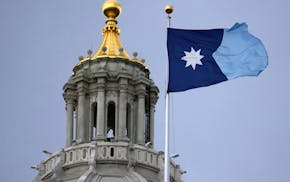A new term keeps popping up in messages from Trump administration scientific agencies - a pledge to restore "gold-standard science."
Many scientists say the opposite is happening.
The administration's "MAHA Report," intended to diagnose the root cause of poor health in American children, was written by Cabinet officials and political appointees, most of whom lack scientific and medical expertise. It included numerous errors, such as garbled references and invented studies. Thousands of grants that went through expert peer review have been terminated because they conflict with political priorities. The administration is proposing to reclassify government officials involved in grant making to "increase career employee accountability," which critics see as a way to inject politics into science.
And in a "Gold Standard Science" executive order last week, President Donald Trump outlined a new level of oversight over what counts as quality evidence and what does not, putting "a senior appointee designated by the agency head" in charge of overseeing "alleged violations." Michael Kratsios, director of the White House Office of Science and Technology Policy, said in a briefing that the goal of the executive order is to "rebuild the American people's confidence in the national science enterprise … the status quo of our research enterprise has brought diminishing returns, wasted resources and public distrust."
Hundreds of scientists are now pushing back, saying that the administration could damage science even as it co-opts the language of a movement aimed at improving it. During the last Trump administration, there were efforts to limit the kind of evidence that could be used to inform environmental policy, and these researchers fear that "gold-standard science" is a wolf in sheep's clothing.
Berna Devezer, a professor of marketing at the University of Idaho who studies "metascience" - research into the scientific process itself - said the enhanced role of political appointees raises serious questions.
"One aspect of the [executive order] that seems clearly alarming from a scientific point of view is the centralization and consolidation of political control over the scientific infrastructure and practice - in other words, regulatory capture of science," she wrote in an email. "Science is essentially effective to the extent that it can remain independent, decentralized, and democratic."
A petition led by the advocacy group Stand Up for Science with more than 5,000 signatories says the executive order has "hijacked" scientific language to do the opposite of what it claims. The order, the petition argues, will "undermine scientific rigor and the transparent progress of science."
Separately, a group of prominent scientists wrote in the Guardian on Thursday, "Hidden beneath the scientific rhetoric is a plan that would destroy scientific independence in the US by giving political appointees the latitude to dismiss entire bodies of research and punish researchers who fail to fall in line with the current administration's objectives."
A White House spokesman and Health and Human Services spokesman did not respond to questions about critiques of the executive order.
The term "gold-standard" is deployed widely, in announcements about phasing out certain food dyes, announcing a shift away from mRNA vaccines to an older technology, reorganizing an office in the department of Health and Human Services and in changing the regulatory framework for approving covid shots.
On the National Cancer Institute Instagram account, a post appeared Thursday saying that a previous post that said communications would be paused had been made "by a career official in an attempt to undermine the Trump administration. … The Trump administration remains fully committed to supporting gold standard cancer research."
The posting generated several hundred comments.
"Is the gold standard science in the room with us?" one user asked.
Improving science
The executive order says "gold-standard science" is:reproducible, transparent, falsifiable, subject to unbiased peer review, clear about uncertainty, skeptical, interdisciplinary, accepting of negative results and free from conflicts of interests.
For years, scientists working in the "open science movement" to improve science have called for many of those principles to be embedded into research. Their goal is to make science more transparent and trustworthy, less biased and vulnerable to fraud.
"If I was just reading section 3 of the executive order, I'd be delighted - oh, fantastic! These are the things I talk about all the time - that it is my mission to advance, that the open science movement has been advocating for," said Brian Nosek, a psychology professor at University of Virginia and a leader in calls for scientific reform.
But the rest of the executive order "goes off the rails," Nosek said. During the first Trump administration, then-Environmental Protection Agency Administrator Scott Pruitt instituted a policy that a study could not be used in rulemaking if its underlying data had not been made public. While scientists are always looking for ways to improve the evidence base, Nosek argued then that policy should be based on the best available evidence and not a checklist such that if it lacks one quality it is simply discounted.
"If you're not using scientific evidence, ideology is what is left," he said.
The executive order provides examples of violations of gold-standard science practices, including federal guidance on reopening schools during the pandemic, environmental policy and climate change.
Science is often seen by the public as a list of immutable facts in a book. But scientists acknowledge that it is a human enterprise, a process that is continuously being improved. There are egos, failures, fraud, honest mistakes, fads and vogues - as well as the diligent and largely unglamorous work of trying to discover something new. Science can and should be better, say critics of science - who do not see the administration working toward that goal in good faith.
"I'm walking this thin line, of saying there is fraud in science - we need to do better, we have to have consequences," Elisabeth Bik, a science integrity consultant and a leader in identifying problematic scientific papers where images have been distorted.
"On the other hand, it doesn't mean all science is fraudulent," Bik said. "It's this extrapolation of things that are wrong in science, to say everything is wrong in science. That is not the case."
- - -
Joel Achenbach, Lena H. Sun and Rachel Roubein contributed to this report.
Wildfire smoke extends Minnesota air-quality alert through Wednesday morning
Minneapolis Council Vice President Chughtai fails to win DFL endorsement; assault allegations fly

A 23-year-old woman was killed in 'war zone' shooting at Minneapolis' Boom Island park

